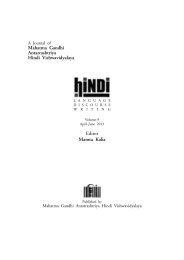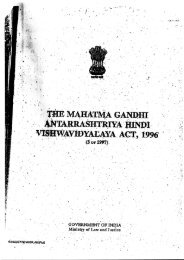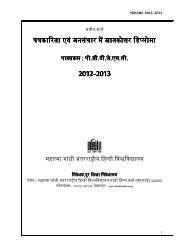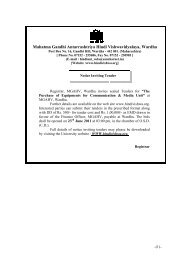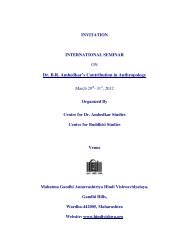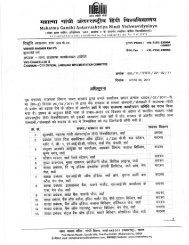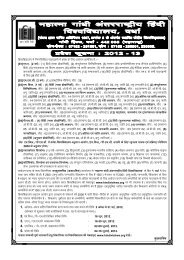A Journal of Mahatma Gandhi Antarrashtriya Hindi Vishwavidyalaya
A Journal of Mahatma Gandhi Antarrashtriya Hindi Vishwavidyalaya
A Journal of Mahatma Gandhi Antarrashtriya Hindi Vishwavidyalaya
You also want an ePaper? Increase the reach of your titles
YUMPU automatically turns print PDFs into web optimized ePapers that Google loves.
the consciousness <strong>of</strong> the colonized nation,<br />
and moulds it for it’s own end. In his<br />
book “A Glimpse at History” Hegel has<br />
written, “Hindus have never possessed any<br />
history <strong>of</strong> their own. Their development<br />
has not taken place in a manner, so as<br />
to attain a political stature. They never<br />
could gain victory over their foreign<br />
invaders, rather they have always been<br />
subjugated by them.”This historical<br />
perspective has greatly influenced<br />
European historians who have dealt with<br />
Indian History. A feeling <strong>of</strong> inferiority<br />
complex crept into the Indian psyche,<br />
which in turn was supremely essential for<br />
the growth <strong>of</strong> national consciousness and<br />
the determination to unshackle the chains<br />
<strong>of</strong> bondage. It became imperative that<br />
along with growth in the feeling <strong>of</strong> anticolonialism,<br />
a new historical perspective<br />
should be developed. Hence, in the 19th<br />
Century, new inroads were made through<br />
historical writings in the field <strong>of</strong> Indian<br />
society, culture and literature giving it<br />
a new dimension. This came to be known<br />
as Nationalist History. Such historical<br />
literature developed in different regions<br />
and in different languages, <strong>of</strong> the country.<br />
Although Madhav Rao Sapre has not written<br />
any historical book, he has written a number<br />
<strong>of</strong> articles and essays relating to them.<br />
He holds the view that, ‘‘for the evolution<br />
<strong>of</strong> human race, there is no better teacher<br />
than history.’’ While dealing with any article<br />
relating to history, he always keeps in<br />
mind its political aspect. In 1907, he wrote<br />
an essay titled “The Italian Patriot Mezzini”.<br />
At that time the Swadeshi Movement had<br />
gained foothold in India, and a large number<br />
<strong>of</strong> youth were actively participating in<br />
it. Whether the youth should participate<br />
in politics or not, became a matter <strong>of</strong><br />
great controversy. In his book “Swadeshi<br />
Movement and Boycott” Sapreji strongly<br />
supported and approved <strong>of</strong> the<br />
participation <strong>of</strong> youth in the political field.<br />
Sapreji in his essay on Mezzini has<br />
clearly written that in the national<br />
awakening <strong>of</strong> Italy Mezzini had played a<br />
key role in inducing Garibaldi to become<br />
an active participant in the struggle. In<br />
the context <strong>of</strong> the political situation existing<br />
in India, the Italian revolution could serve<br />
as the best example.During the Swadeshi<br />
Movement, the glorious struggle <strong>of</strong> Mezzini<br />
and Garibaldi gained immense popularity<br />
across the country. Their highly<br />
inspirational life history came to be written<br />
in many Indian languages. In 1913, Sapreji<br />
wrote a series <strong>of</strong> six essays based on<br />
“Lessons to be learnt from European<br />
History”, which were published in<br />
‘Saraswati’. Besides examining and analyzing<br />
the Greek and the Roman revolution, it<br />
also dealt with the English and the French<br />
Revolution, the Renaissance and the<br />
religious history <strong>of</strong> Europe.In one <strong>of</strong> his<br />
essays on Greece, he has written, “If the<br />
people living in different regions <strong>of</strong> our<br />
country, speaking different languages,<br />
following different religions, customs and<br />
cultures could draw inspiration from the<br />
January-March 2012 :: 19



